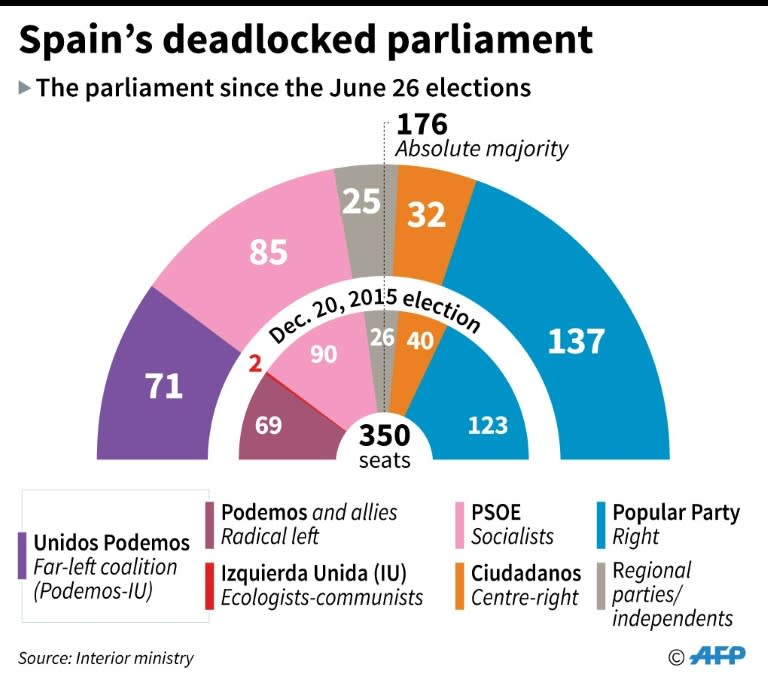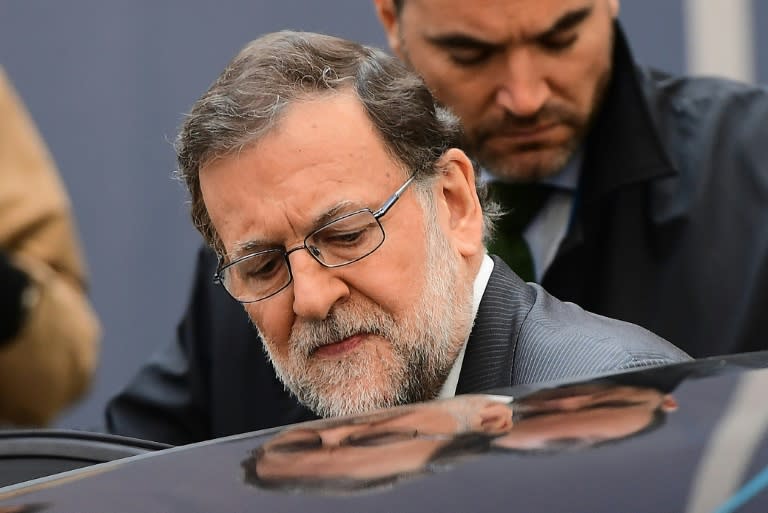Spain heads for minority government as Socialists lift veto
Spain's Socialists voted Sunday to allow the conservatives to take power, likely ending a protracted political deadlock and avoiding a third election for poll weary Spaniards. The decision paves the way for acting Prime Minister Mariano Rajoy -- whose conservative Popular Party (PP) won two elections in December 2015 and June this year but without an absolute majority -- to form a government by November. But while this eases uncertainty in a country that has been without a fully-functioning executive for ten months, Rajoy's government will be extremely weak, backed by just 137 lawmakers in a 350-strong parliament and with strong opposition led by the Socialists and far-left Unidos Podemos. Both the Socialists and Unidos Podemos had categorically refused to back Rajoy, fed up with corruption scandals and rising inequalities that marked his first four-year term, paralysing his attempts to form a government. But as the prospect of a third election grew nearer, bitter divisions emerged within the Socialists and on Sunday the party announced its policy-setting federal committee had voted 139 to 96 in favour of allowing Rajoy to rule. They decided to abstain in a parliamentary confidence vote on a Rajoy-led government instead of casting their ballot against it as they did in a previous September vote. This will give Rajoy's government enough traction to see it through the vote. "Repeat elections would harm the interests of Spain and the Spanish," read the resolution that was voted through. It added that a third poll could also hurt the Socialists themselves, who would be held responsible for "a blockage that no one wants." - New government - But the decision came at a price. Following dismal election results, the Socialist party has been decimated by in-fighting over how to handle the political blockage. The divisions came to a head earlier this month when high-ranking Socialists amenable to a conservative government -- so as to avoid a third election -- forced party leader Pedro Sanchez out. Sanchez had long opposed Rajoy, who came to power in 2011. With him out of the way and the party run by an interim executive, those who dislodged him got their way. Now that the Socialists have decided to abstain, Rajoy is expected to quickly submit himself to another parliamentary vote of confidence next weekend, confident of victory. By November 1, Spain should finally get a government at a sensitive time as the country recovers from a devastanting economic crisis. But the PP's government will be weak. It will face opposition not only from the Socialists but also two upstart parties -- Unidos Podemos and centrists Ciudadanos. Their participation in the last two elections put an end to Spain's traditional two-party system. Even Rajoy admitted it would be tough. "If I want more support, it's logical that I adapt my discourse to the new situation," he said Friday on the sidelines of a European summit. "Mariano Rajoy will have the least parliamentary support in Spain's history," said political analyst Pablo Simon. "It's more than likely that it will be a short term," he added, pointing out that Rajoy may decide to call early elections, particularly if the opposition remains as divided as it is now. - Restore credibility - And for many Socialist lawmakers, these divisions have been hugely damaging and many fear that the party will alienate its grassroots members by allowing a PP government to rule. "It's not just because of the abstention but also because of the shameful spectacle that the PSOE has presented in the past days," Socialist lawmaker Susana Sumelzo said in a weekend interview with online daily El Espanol. "I predict that in the medium and long-term, it will be very complicated. We will have to work a huge amount to get our credibility back."





